Abstract
The socio-economic and political changes taking place in modern society has led to the transformation of the family as a social institution. Serious psychological problems associated with life choices and family self-determination are detected in the environment that youth live in. Against this background, studying the factors and conditions influencing the formation and development of family self-determination of students in the process of professionalization becomes particularly urgent. The purpose of this research is to study the characteristics of family self-determination of students depending on the educational and professional activities, educational environment and socio-psychological environment. To achieve this goal, a set of the following complementary research methods were used: theoretical and methodological analysis of literary sources; survey, psych diagnostic methods; and mathematical-statistical methods of data processing. The results of the empirical study involving 774 university students indicate that the professional orientation (for example in such educational areas as Psychological and Pedagogical Education, Psychology, Sociology, Public and Municipal Administration, and Management) and the educational level are important determinants of activation of family self-determination for students. Professional orientation causes development of such components of family self - determination as cognitive, value - emotional, regulatory and behavioral, motivational, reflexive. Family self-determination of students in the process of professionalization in high school is a dynamic phenomenon. This stage of training is associated with the change of importance of such elements as the position of an individual in the family structure, attitude to the romantic type of love, my past, marriage motives – harmonious sexual relations, communication with people.
Keywords: Family self-determinationprofessionalizationstudent’s youth
Introduction
As a result of dynamic changes in modern society the interest in the study of self-determination (identity) of the individual has increased in domestic and foreign psychology. Scientists have developed several different aspects of self-determination: personal self-determination (Ginzburg, 1994; Orestova & Karabanova, 2005; Vorobieva & Akbarova, 2015), professional identity (Klimov, 2005; Prjazhnikov, 2017; Karabanova, 2016), family self-determination (Merzlyakova, 2015; 2014; 2016), economic self-determination (Zhuravlev & Kupreychenko, 2013), civil-cultural identity (Batarchuk, 2014), multicultural identity (Batarchuk, 2017), gender identity (Zinchenko, Zotova, & Tarasova, 2017), and virtual identity (Asmolov & Asmolov, 2009). There are serious psychological problems associated with life choice and self-determination in the youth’s environment. Dubrovina (2015) notes that one of the important aspects of self-determination of an adult is the formation of his readiness to create his own family in the future. Against this background, the problem of studying structural and content characteristics of family self-determination, the search for socio-psychological factors that determine the increase in the prestige of the family and family lifestyle among young people becomes particularly relevant. In this regard, the use of non-family forms of youth’s preparation for family life should be carefully developed and implemented. Educational institutions (schools, colleges, universities), psychological services, social organizations, Registry offices have great potential to enhance family self-determination of young people.
Problem Statement
Family self-determination of modern students’ is closely interconnected with such processes as socialization and adaptation, personal and professional development. The analysis of interaction and mutual influence of these processes reveals the system of determinants, general and specific for different groups of youth regularities of family self-determination in the course of professionalization. The process of professionalization is understood as "the integral continuous formation of the personality of a specialist and a professional, which begins with the choice of profession, lasts for the entire professional life of a person and ends when he stops his professional activity" (Zhuravlev & Kupreychenko, 2013, p.180).
In the context of our research, professionalism is an important factor in the formation and development of family self-determination of students. A dangerous tendency is observed in the development of the institution of family and marriage due to the lack of schools, secondary and higher educational institutions of prenatal education as a systematic impact on the younger generation in order to prepare and engage them in marriage and family relations, and form the personality of a family man in the process of education. Purposeful formation of family self-determination is realized in the educational process and upbringing. The lack of study of family self-determination as a psychological phenomenon does not permit the development effective methods for optimizing the process of preparation of modern youth for marriage and family life in the educational environment of the university. Elimination of the contradiction between the need of modern society in fostering family values, strengthening the authority of the family in the youth’s environment and the need to identify psychological and pedagogical conditions of purposeful formation of family self-determination of students determines the problem of this research.
Research Questions
The following questions will be investigated in this study.
Is the professional orientation a factor of activation and formation of family self-determination among students?
What role does the training stage (course) play in the process of family self-determination of modern students?
Purpose of the Study
The purpose of the research is to study the peculiarities of the content-structural characteristics of family self-determination of modern students depending on the educational and professional activities, educational environment and socio-psychological environment.
We hypothesized that the family self-determination of students in the process of their professionalization is determined by a number of factors: their professional orientation and the stage of training.
In accordance with the research goal and hypothesis, we conducted a study aimed at solving the following problems.
To assess the validity of differences in components of family self-determination depending on the professional orientation.
To investigate the influence of the training stage (course) on the process of family self-determination of students.
Research Methods
Research Instruments
For diagnostics of substantial and structural characteristics of family self-determination, the method of semantic differential, the questionnaire A Value and Availability Ratio in Various Vital Spheres Technique, and a projective technique Incomplete Sentences, and A Purpose-in-Life Test were used to collect the data.
Data analysis procedures
Mathematical-statistical methods were used for the data analysis that allowed us to establish reliability of results of our research. All calculations were performed by means of the computer program IBM SPSS Statistics 21. Descriptive Statistics, the Kolmogorov-Smirnov’s test, Kruskal-Wallace’s criterion of one-factor dispersion analysis for independent samples (F), and Spearman's rank correlation (rs) were used to analyse the data.
Research Sample
The study was conducted in the Astrakhan state University, the Astrakhan branch of the Russian Presidential Academy of National Economy and Public Administration. The study involved 774 students: 295 first year students, 196 second year students, 127 third year students, 156 fourth year students majoring in Psychological and Pedagogical Education, Psychology, Sociology, Public and Municipal Administration, and Management.
Findings
The impact of such a factor as professional orientation on family self-determination
To assess the impact of such a factor as professional orientation on family self-determination, the analysis of the structural and content characteristics of the examined phenomenon for students majoring in the following courses - Psychological and Pedagogical Education, Psychology, Sociology, Public and Municipal Administration, and Management - was carried out. The structure of family self-determination is a set of interrelated components, the qualitative characteristics of which determine the indicators of readiness of the individual for marriage and family life. The cognitive component includes the necessary range of knowledge about the life of a modern family, the formation of the cognitive image of “I am a future family man (I am a future husband / wife, I am a future father / mother, I am an owner, I am a son / daughter)” and ideas about the future marriage partner (an ideal husband / wife, an ideal father / mother).
Differences in the level of statistical significance were found for such elements as “I am a future father / mother” (the value of the criterion H = 7.796 at the level of significance p = 0.05); “I am an owner” (H = 11.434 at p = 0.01). The value of parenthood is lower among students majoring in Management in comparison with other courses (Fig.1). The median values indicate that the significance of the image “I am an owner” is lower among the students majoring in Sociology and Management.
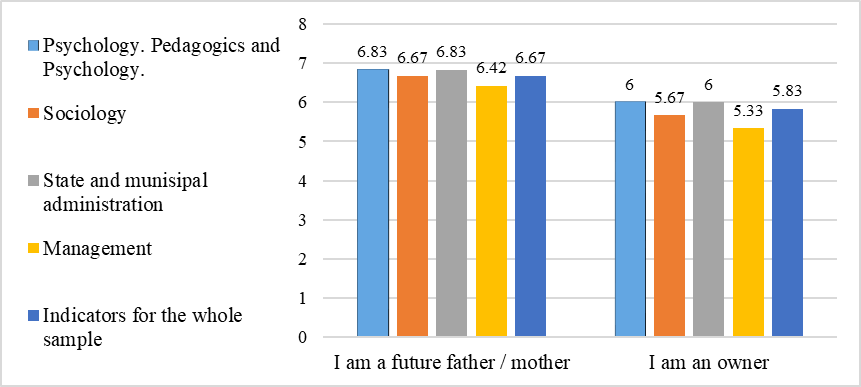
The value-emotional component comprises family values (happy family life, freedom, love, marriage, parents’ family, my future family, parents), assessment and perception of marriage and family relations (relation to the family status of the individual within the family structure, marriage, parent, family, mother, father, future marriage partner, future children, myself, romantic type of love, sex, family recreation and leisure), and life orientation (purpose in life, process of life, productivity of life, meaning of life).
Significant differences for the following elements of family self-determination were revealed: the “parent family” (H = 15.169 at p = 0.002), “my mother” (H = 12.644 at p = 0.005), the “attitude to family” (H = 18.551 at p < 0.0001), “We are family, attitude to your own family” (H = 12.931 at p = 0.005), “attitude to future children” (H = 19.408 at p < 0.0001), “attitude to family recreation and leisure” (H = p = 0.001), “attitude to father” (H = 7.885 at p = 0.048), “meaningfulness of life” (H = 7.916 at p = 0.048).
Figure
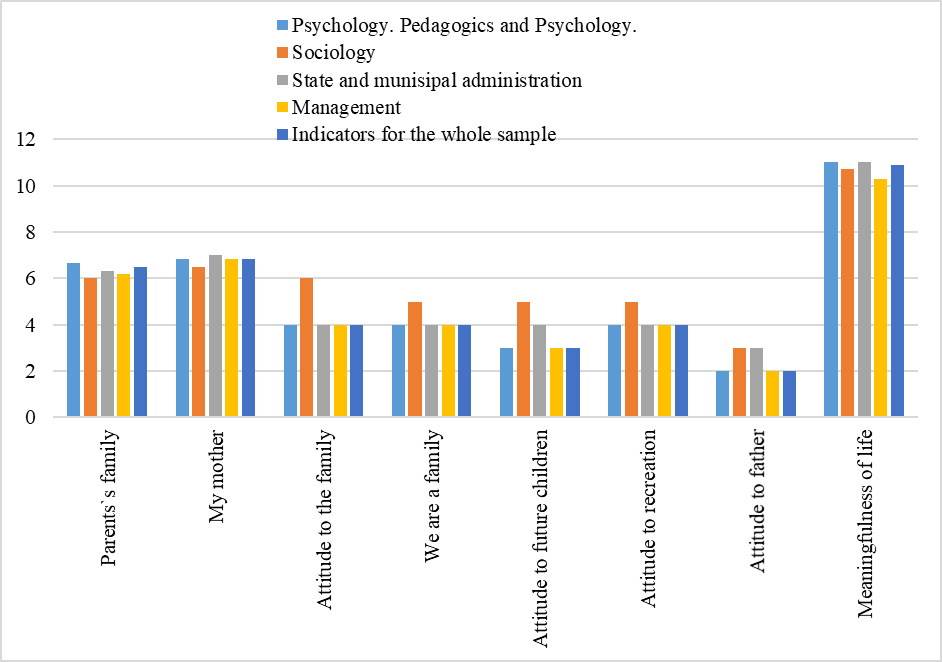
Regulatory-behavioral component comprises a set of operations and ways for achieving a conscious goal of activity, namely: building life plans in the time perspective (my past, my present, my future), orientation in social family roles and interpersonal relationships (leadership and responsibility in the family, the rights and responsibilities of spouses), communicative initiative and activity in interaction, effective communicative skills and resolution of family conflicts (attitude to conflicts and divorce), willed self-regulation, self-control. Differences in the level of statistical significance are found for such elements of family self-determination as “my past” (H = 13.529 at p = 0.004), “my present” (H = 9.026 at p = 0.029), “my future” (H = 8.769 at p = 0.033), “primacy and responsibility in the family” (H = 26.775 at p < 0.0001), the “rights and obligations of spouses” (H = 16.281 at p = 0.001), “attitude to divorce” (H = 19.535 at p < 0.0001), “attitude to family conflicts” (H = 17.031 at p = 0.001).
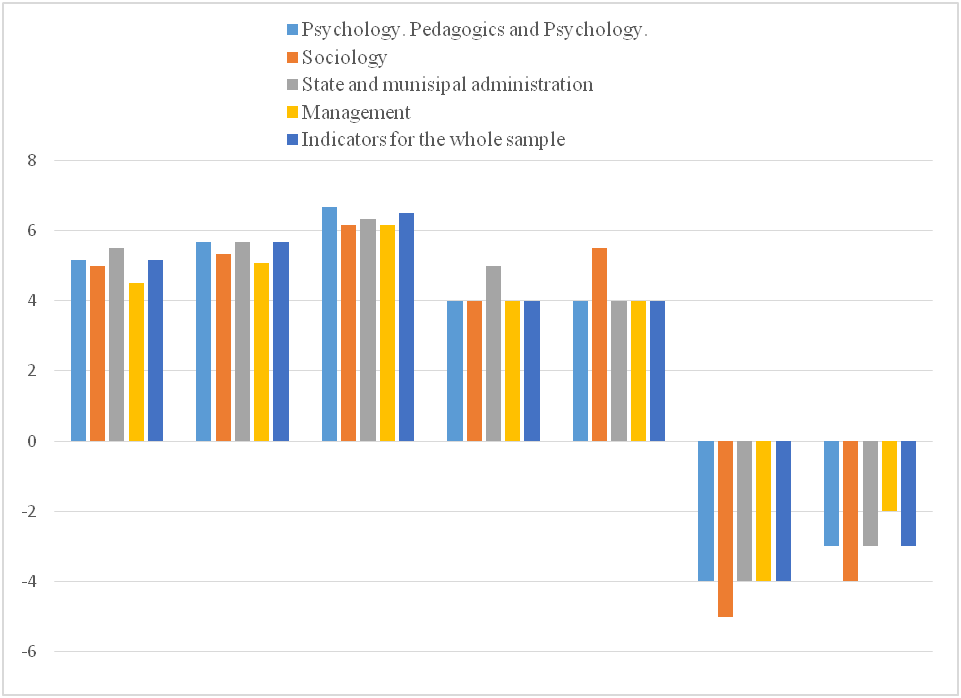
From Figure
The motivational component of family self-determination reflects motivation for marriage. This research studied the peculiarities of marriage motives such as security, harmonious sexual relations, duty, success, compensation for the feeling of loneliness, personal independence, love, material well-being, revenge, communication with people, recognition of others, parenthood, self-actualization, and happiness. Some significant differences were found between such marital motives as “achievement of success” (H = 21.217, p < 0.0001) and “self-actualization” (H = 8.008 p = 0.046). The motives of marriage mentioned here are the most attractive for the students majoring in Management (Fig.4). Students majoring in Sociology have lower indicators of success and self-actualization below the selective median.
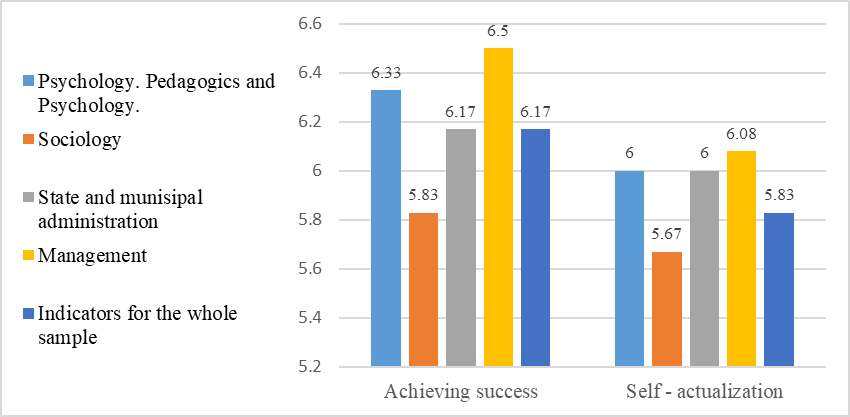
The reflexive component of family self-determination implies the presence of such qualities as an objective self-assessment and evaluation of your personal activity, developed self-consciousness and self- understanding, internal locus of control (locus of control is self, locus of control is life), critical evaluation of the achieved results and forecasting of subsequent results. Some significant differences were found in the indicators of “self-confidence” (H = 11.913 at p = 0.008), “life as locus of control” (H = 7.871 at p = 0.049) for the students majoring in different courses. Fig. 5 shows that the indicators of self-confidence, freedom from internal contradictions are above the value of the median in the sample as a whole for the students majoring in Sociology and State and municipal administration. Students majoring in Management have lower indices on the scale of life as locus of control than other students.
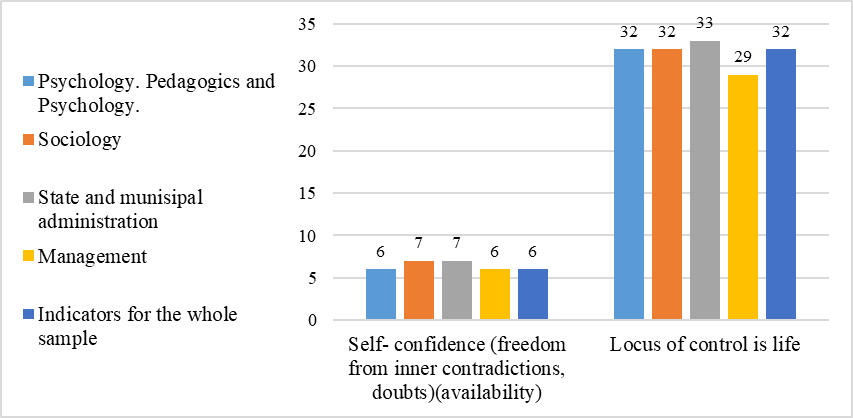
Results of statistical analysis
Correlation analysis was used in the study of the influence of the level of training on the process of family self-determination of students. Spearman’s rank correlation revealed a significant correlation for such elements of family self-determination as the “position of an individual within the family structure” (r s = -0.146 if p = 0.009), “attitude to the romantic type of love” (r s = -0.163, p = 0.003), “my past” (r s = -0.103 p = 0.007), “harmonious sexual relationship” (r s = 0.092 p = 0.016), “communicating with people” (r s = -0.125 at p = 0.001).
Negative correlation coefficient means that junior students had a more positive attitude to the position of an individual in the structure of the family, romantic type of love, value of the past, the importance of such a motive for marriage as communication with people than senior students. A positive correlation indicates that the importance of the motive of harmonious sexual relations for marriage for senior students increases.
Conclusion
The analysis conducted in this research has shown that professionalization is a significant factor in the actualization and development of family self-determination of students.
Professional orientation determines the development of structural content characteristics of family self-determination for the students. Students majoring in Psychological and Pedagogical education, and Psychology have indicators of the family self-determination corresponding to the values of median for the whole sample and above it. In our opinion, such subjects as "Psychology of a personality", "Psychology of family self-determination", "Psychology of a family", "Psychological and pedagogical support of a family", "Basics of family consulting" contribute to the systematic and purposeful formation of family self-determination of modern students.
Family self-determination of students in the process of professionalization in high school is a dynamic phenomenon. The dynamics reflect the change of life priorities, goals, relations in the marriage and family sphere.
References
- Asmolov, A. G., & Asmolov, G. A. (2009). From We-Media to I-Media: Identity Transformations in the Virtual World. Psychology in Russia: State of the Art, 2, 101-123.
- Batarchuk, D. S. (2014). The Specificity of the Russian Civic-cultural Identity of Students. Akmeology, 2(50), 60-69.
- Batarchuk, D. S. (2017). The Problem of Interethnic Youth Relations in Multiethnic Educational Environment. Procedia - Social and Behavioral Sciences, 237, 1589-1592.
- Dubrovina, I. V. (2015). Preparation of youth for family life, or “forgotten” self-determination. Herald of Practical Psychology of education, 3(44), 17-23.
- Ginzburg, M. R. (1994). The Psychological Content of Personal Self-determination. Questions of Psychology, 3, 43-53.
- Karabanova, O. A. (2016). Parent-child Relationships as a Factor of Professional Self-identity in Adolescence and Young Adulthood. The Moscow University Herald. Series 14. Psychology, 3, 54 – 61.
- Klimov, E. A. (2005). Psychology of Professional Determination. Moscow: Academy Publ., p. 304
- Merzlyakova, S. V. (2014). A Children-parent Relationships as a Condition of Formation of the Family Self-determination of Youth. World of Scientific Discoveries, Series A., 2(2), 38-51.
- Merzlyakova, S. V. (2015). Model of Psychology-pedagogical Support of Family Self-determination Development of Student’s Youth. World of Scientific Discoveries, Series A., 1(3), 121-134.
- Merzlyakova, S. V. (2016). Sociocultural Determinants of Modern Youth’s Family Self-determination. Modern Research of Social Problems, 11(67), 123 – 135.
- Orestova, V. R., & Karabanova, O. A. (2005) Methods of Identity Research in the Concept of Statuses of an Ego-identity of J. Marsia. Psychology and School, 1, 39-50.
- Prjazhnikov, N. S. (2017). Guidance Methods in Psychological “Spaces” of Self-determination. National Psychological Journal, 3, 144 – 150.
- Vorobieva, A. E., & Akbarova, A. A. (2015). The Analysis and Perspectives of Studying Basic and Special Types of Self-determination according to A.L. Zhuravlev’s and A.B. Kupreichenko’s Concept. Psychology in Russia: State of the Art, 8(4), 46-59
- Zhuravlev, A. L., & Kupreichenko, A. B. (2013). Economic self-determination: theory and empirical study. M: Publishing House “Institute of Psychology of RAS”, 2007. p. 480
- Zinchenko, Yu. P., Zotova, O. Yu., & Tarasova, L. V. (2017). Specifics of Interpersonal Trust among People with Different Gender Identities. Psychology in Russia: State of the Art, 10(2), 134-148.
Copyright information

This work is licensed under a Creative Commons Attribution-NonCommercial-NoDerivatives 4.0 International License.
About this article
Publication Date
14 January 2019
Article Doi
eBook ISBN
978-1-80296-052-5
Publisher
Future Academy
Volume
53
Print ISBN (optional)
-
Edition Number
1st Edition
Pages
1-812
Subjects
Education, educational psychology, counselling psychology
Cite this article as:
Merzlyakova, S., Zhilkina, V., Zobnina, O., & Sokova, N. (2019). Family Self-Determination Of Students In The Process Of Professionalization. In Z. Bekirogullari, M. Y. Minas, & R. X. Thambusamy (Eds.), ICEEPSY 2018: Education and Educational Psychology, vol 53. European Proceedings of Social and Behavioural Sciences (pp. 347-355). Future Academy. https://doi.org/10.15405/epsbs.2019.01.33

